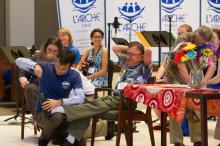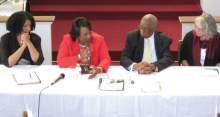50 years

Krista Tippett, host of the successful podcast On Being, is one of those transformed people. She described to Sojourners how her radio pilgrimage to an Iowa L’Arche community and an interview with L’Arche founder and Templeton Prize winner Jean Vanier influenced her way of thinking about Christianity:
“What I love about L’Arche is that it is a living manifestation of some of the most paradoxical and lofty ideals of Christianity — strength and weakness, light and darkness — that our culture and some of our churches can barely grasp. It’s very countercultural, very paradoxical. But it’s embodied at L’Arche—lived and breathed in an everyday way.”
After a flower procession and a dramatization of the origin story of L’Arche, Tippett joined in on the 50th-anniversary celebrations by publicly interviewing four L’Arche community members.

BERNICE KING watched as, one by one, the heads of denominations from across the nation bent down to sign the Christian Churches Together in the U.S.A. “Response to Dr. Martin Luther King Jr.’s ‘Letter from Birmingham Jail.’” Transfixed, King—Martin King’s daughter—sat in the first row of a church one block from Kelly Ingram Park, where 50 years before children had run scared, ravaged by German shepherds and fire hoses.
As they signed, the presidents of CCT’s five church “families” stepped to the podium. Each read his or her church family’s confession of complicity with the demons of racism and injustice during and since the civil rights era.
Fifty years ago, Martin Luther King Jr. sat behind bars in the Birmingham city jail and responded to criticism from eight local white clergy’s “Call for Unity” against outside agitators. King penned prophetic words in the margins of the newspaper that carried the white clergy’s call for “law and order and common sense.”
“Injustice anywhere is a threat to justice everywhere,” King explained. He recounted the failed attempts to negotiate with city officials hell-bent on living a “monologue rather than dialogue.” He clarified: “The purpose of our direct-action program is to create a situation so crisis-packed that it will inevitably open the door to negotiation.”